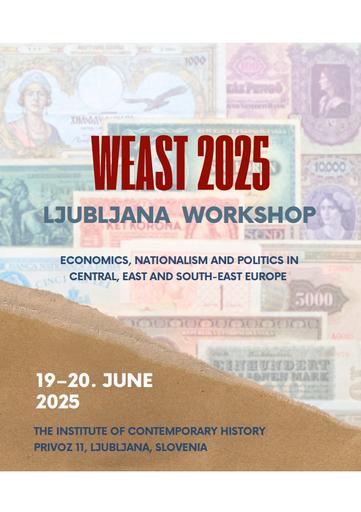/
Dogodki
/
Konference
Narratives of economic subjugation in Croatian politics in Austro-Hungary and Yugoslavia
A comparative case study of Josip Frank and Rudolf Bićanić


To delo avtorja Petar Ćurčić je ponujeno pod Creative Commons Priznanje avtorstva-Nekomercialno-Deljenje pod enakimi pogoji 4.0 Mednarodna
Datoteke (1)
Opis
From the 16th century until 1918, the region of present-day Croatia was part of various complex political entities. It was incorporated into the Habsburg Monarchy, which persisted until the collapse of Austria-Hungary. Subsequently, Croatia became part of the Kingdom of Serbs, Croats, and Slovenes, and later Yugoslavia, experiencing multiple political reconfigurations. A significant historical arrangement was Croatia’s personal union with Hungary, which spanned several centuries. Over time, this union became increasingly lopsided, with Croatia losing jurisdiction, particularly after the Austro-Hungarian compromise of 1867. The erosion of Croatian autonomy was a central issue for the opposition Party of Rights, which criticised the political and economic subjugation under Hungary. A pivotal figure in articulating these grievances was Josip Frank (1844–1911), a Croatian politician of Jewish descent. In works such as Die Quote Kroatiens (1879), and through his speeches in the Parliament of the Triune Kingdom of Croatia, Slavonia, and Dalmatia, Frank remained a vocal critic of Budapest’s economic policies and their adverse impact on Croatia’s development. After the dissolution of Austria-Hungary, the newly formed Kingdom of Serbs, Croats, and Slovenes (later Yugoslavia) introduced new political framework, but many Croatian political factions, notably the Croatian Peasant Party, rejected the new political system. As a result, the perception of economic subjugation persisted. Rudolf Bićanić (1905–1968), an economist and member of the Croatian Peasant Party, further developed this critique in his 1938 work The Economic Basis of the Croatian Question, where he detailed the economic exploitation of Croatia by the Yugoslav state. This paper critically examines the enduring perception of Croatia’s economic subordination, tracing its development across various political regimes. By analysing the views of Croatian politicians and intellectuals from the Habsburg period to Yugoslavia, it explores the historical and ideological forces shaping these perceptions, offering insight into Croatia’s struggle for economic autonomy.
Metapodatki (11)
- identifikatorhttps://hdl.handle.net/11686/71114
- naslov
- Narratives of economic subjugation in Croatian politics in Austro-Hungary and Yugoslavia
- A comparative case study of Josip Frank and Rudolf Bićanić
- avtor
- Petar Ćurčić
- soavtor
- Jelena Rafailović (mod.)
- predmet
- ekonomija
- Hrvaška
- Jugoslavija
- Avstro-Ogrska
- Josip Frank
- Rudolf Bićanić
- opis
- From the 16th century until 1918, the region of present-day Croatia was part of various complex political entities. It was incorporated into the Habsburg Monarchy, which persisted until the collapse of Austria-Hungary. Subsequently, Croatia became part of the Kingdom of Serbs, Croats, and Slovenes, and later Yugoslavia, experiencing multiple political reconfigurations. A significant historical arrangement was Croatia’s personal union with Hungary, which spanned several centuries. Over time, this union became increasingly lopsided, with Croatia losing jurisdiction, particularly after the Austro-Hungarian compromise of 1867. The erosion of Croatian autonomy was a central issue for the opposition Party of Rights, which criticised the political and economic subjugation under Hungary. A pivotal figure in articulating these grievances was Josip Frank (1844–1911), a Croatian politician of Jewish descent. In works such as Die Quote Kroatiens (1879), and through his speeches in the Parliament of the Triune Kingdom of Croatia, Slavonia, and Dalmatia, Frank remained a vocal critic of Budapest’s economic policies and their adverse impact on Croatia’s development. After the dissolution of Austria-Hungary, the newly formed Kingdom of Serbs, Croats, and Slovenes (later Yugoslavia) introduced new political framework, but many Croatian political factions, notably the Croatian Peasant Party, rejected the new political system. As a result, the perception of economic subjugation persisted. Rudolf Bićanić (1905–1968), an economist and member of the Croatian Peasant Party, further developed this critique in his 1938 work The Economic Basis of the Croatian Question, where he detailed the economic exploitation of Croatia by the Yugoslav state. This paper critically examines the enduring perception of Croatia’s economic subordination, tracing its development across various political regimes. By analysing the views of Croatian politicians and intellectuals from the Habsburg period to Yugoslavia, it explores the historical and ideological forces shaping these perceptions, offering insight into Croatia’s struggle for economic autonomy.
- datum
- 20. 06. 2025
- tip
- video
- jezik
- Angleščina
- jeDelOd
- pravice
- licenca: ccByNcSa
